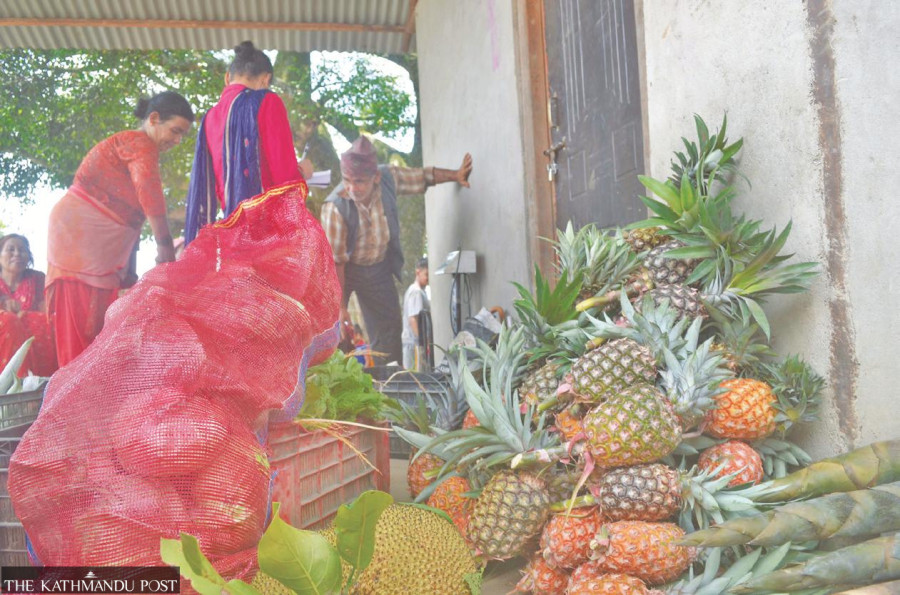Money
How barter stores are sparing farmers marketing hassle
They take agricultural and forest products from the farmers and give them daily essentials in exchange.
Dipendra Baduwal & Gaganshila Khadka
Market access has been a major hurdle for farmers in Nepal, and sometimes they have to watch helplessly as their vegetables worth millions rot in the fields for lack of buyers.
But not farmers in Gulmi: they have no such problem because a barter store comes to their villages to collect their vegetable harvests.
Paicho Pasal, which operates a chain of barter stores, takes agricultural and forest products from the farmers and gives them daily essentials in exchange. They bring food products such as sugar, cooking oil and salt and garments to the villages, which they swap for farm products.
If the farmers don’t want to barter, the shops also pay cash.
"Paicho Pasal also invests in farmers," said Keshav Neupane, its chief operating officer. “We provide technical service too. We help farmers to test the soil and provide quality seeds.”
The shop makes pickles, jam and other products from the organic produce collected from farmers. “We sell them in the domestic market and also export them,” said Neupane.
Ram Bahadur Nepali's field is covered with cauliflowers, and he is not worried about their sale. Nepali of Basad in Rurukshetra Rural Municipality-5 has cultivated vegetables targeting the upcoming festivals.
“They will be ready for harvest during the Teej and Dashain festivals,” he said. Nepali switched to commercial vegetable farming after growing maize for several years.
“I earned extra money by planting turnip and coriander along with cauliflower,” he said. Nepali claims he makes Rs500,000 annually.
Paicho Pasal has been a boon for many farmers. “Small farmers can exchange their produce for daily necessities such as salt, oil, soap and food items,” Nepali said.
“We don’t have to worry about the market as Paicho collects our vegetables.”
Him Lal Puri from Bamgha has been a vegetable farmer for four decades, and remembers having a hard time selling his vegetables whenever he had a bumper harvest.
“We had to carry our produce to markets in Ulli Khola and Khaireni Bazaar spending hours,” said Puri, who owns a 5-ropani farm.
“I sell vegetables worth Rs200,000 annually. The only expense is buying seeds.”
Until two years ago, Puri ploughed his fields using oxen. Now he uses a mini tiller. “The rise in our income has enabled us to use technology. We are also investing in our children's education,” he said.
More than 150 households in Bamgha are engaged in commercial vegetable farming, according to Chet Narayan Shrestha, chairman of the Smart Agriculture Village Programme, an initiative of the provincial government to assist farmers.
“Paicho Pasal alone has been buying vegetables worth Rs20 million annually,” Shrestha said.
Paicho Pasal has motivated the villagers in commercial vegetable farming since 2014.
Earlier, farmers were engaged in traditional farming. Output was low and they could sell their produce only when they had an abundant harvest. Modern technology has helped them to increase their production.
Iman Singh Rana of Chhatrakot Rural Municipality-2, Pallikot uses modern technology in farming. Rana has built 14 permanent tunnels, or greenhouses made of plastic and bamboo.
“I have cultivated tomatoes on 10 ropanis,” said Rana. “In the same tunnels, I have also planted beans and cucumbers.”
Rana spent two decades of his youth as a welder in India. He started vegetable farming around seven years ago. “The income from farming has been better than what I used to make in India,” he said.
Rana has hired two farm hands to help him. “Besides one daily meal, I pay them Rs12,000 each a month,” he said. According to Rana, he makes a profit of Rs600,000 yearly.
Rana’s home is a collection centre for vegetables produced by local farmers. “We collect vegetables twice a week,” he said. “Then Paicho takes them away.”
Thulapokhara at Chhatrakot-1 is a vegetable production centre. Around 500 households in the area are involved in vegetable farming, according to local residents.
Bhuwan Kharal, 29, is among the highest earners in the area. “I produce vegetables worth Rs5 million annually,” said Kharal.
Chhatrakot Rural Municipality has prioritised the use of modern technology, according to Kharal. Every household has built plastic tunnels and uses mulching techniques.
Kharal grows vegetables on 80 ropanis. “Besides this, I am about to start a vegetable farm on 400 ropanis at Argheli in Palpa district,” he said.
"While tomatoes and chillies used to be produced in large quantities in the past, red turnip, cucumber, cauliflower and cabbage are also produced these days," he added.
Kharal, who has a bachelor’s degree in education, had once made up his mind to go abroad to earn more. “But when I saw my elder brother flourishing on the farm, I changed my mind,” he said.
Paicho provides technical assistance to farmers, according to Kharal. “Technicians from Paicho visit us regularly,” he said.
Kharal produces 80 tonnes of tomatoes, 30 tonnes of chillies, 20 tonnes of cauliflowers and 10 tonnes of red turnips annually.
Farmers in many districts still rely on rainwater for irrigation. “We need irrigation facilities,” said Kharal.
According to Paicho, it has mobilised 16 technicians, including a graduate in agriculture, with different areas of expertise to assist the farmers across the district.
“Our technicians help farmers at every stage from planting to harvesting,” said Dhruba Neupane, managing director of Paicho Pasal.
"We have signed contracts with farmers to buy their produce since market access is equally important. We run a collection centre in every village. The farmers are paid instantly.”
Farmers in Gulmi produce vegetables worth Rs230 million every year, according to Navaraj Bhandari, chief of the Agriculture Knowledge Centre in the district.
Commercial vegetable farming is done on 960 hectares. The 5,000 tunnels or greenhouses cover an area of 30 hectares. Chhatrakot, Rurukshetra, Satyawati, Chandrakot and Kaligandaki rural municipalities, and Resunga and Musikot municipalities are pocket areas for vegetables.
While vegetables worth Rs127.5 million are sold in other districts, crops worth Rs102.5 million are consumed locally.
"Around 11,503 tonnes of vegetables are produced in the district every year," said Bhandari. "There are 49,965 commercial vegetable farmers.”




 9.7°C Kathmandu
9.7°C Kathmandu
















